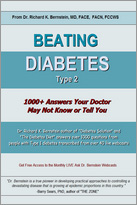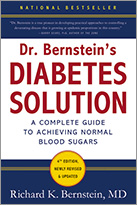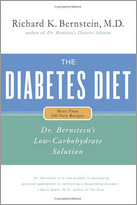by Richard K. Bernstein, M.D., F.A.C.E., F.A.C.N., C.W.S.
April 2003
Diabetes Interview
A comment by a reader that appeared in the December 2002 issue of Diabetes Interview (“‘Perfect’ Comments,” Letters to the Editor, p. 11) destroyed my long-held assumption that it is only physicians who criticize medical treatments without reading them. In her letter, she commented that, with a low-carbo regimen, “you are not eating a balanced diet for your overall health.” This could not be further from the truth.
Virtually all my patients, prior to reading one of my books or seeing me for training, were following one version or another of the American Diabetes Association’s high-carbohydrate diet. As a result, they suffered not only from the long-term complications caused by elevated blood sugars, but also the discernable results of malnutrition, such as deterioration of their teeth and retracted gums. This was certainly not helped by the urination of water-soluble vitamins that accompanied loss of glucose in their urine. Carbohydrate, to most, was bread, potatoes, desserts, sweetened cereals, skim milk and pasta-all recommended by the ADA. Deliberate consumption of nutritious vegetables was rare.
Our low-carbo diet attempts to emulate what was available to our ancestors before agriculture (with the creation of bread and, later, sweet fruits) introduced dental disease, atherosclerosis and diminished lifespan. In prehistoric times, humanity survived and evolved eating animal sources and whole plants-mostly leaves and stalks.
When I discovered, 33 years ago, that blood sugar could not be controlled with a high-carbo diet, I remembered that during the twentieth century a new vitamin was being discovered every 15 years or so. I, therefore, assumed that vegetables, as we now know, still contained some nutrients that could not be obtained from vitamin pills. I thus added vegetables to my diet and, to this day, negotiate meal plans with my patients that include vegetables as their only source of carbohydrate. At my insistence, most of my patients eat vegetables at all or at least two of their meals. Now, many diabetics who rarely consumed vegetables are learning to enjoy them.
Humans can survive without carbohydrate, but they cannot survive without essential fatty acids and essential amino acids (found in protein foods). The marvelous outcomes for people who follow our diet appear in testimonials by readers of my book “Diabetes Solution” online at www.amazon.com and www.amazon.com.uk. High-carbo diets are not “balanced” and bear little in common with the diets on which humanity evolved.
I have had type 1 diabetes for 57 years and have been on a low-carbohydrate diet for 33 of those years. This diet has reversed many of my prior long-term diabetes complications, including kidney disease, vascular disease and cardiac disease. I practice medicine and write 10 hours daily and enjoy better health than most physicians many years my junior.




